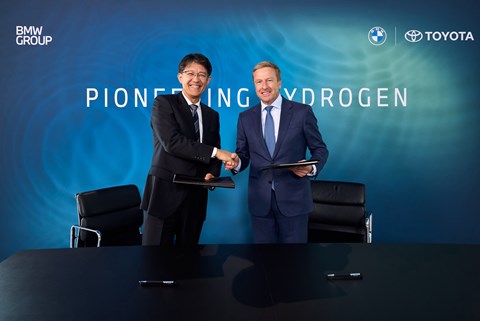► BMW and Toyota join forces on hydrogen tech
► ‘Next-gen’ fuel cell powertrain to be jointly developed
► BMW says it’ll have a FCEV production car on the road by 2028
BMW Group and Toyota Motor Corporation have announced a new partnership regarding hydrogen fuel cell vehicles, confirming the two major car makers will jointly develop the ‘next generation of fuel cell technology.’
On top of that, BMW has announced that as part of the partnership plans, it will launch a fuel cell production vehicle in 2028. Oliver Zipse, chairman of the BMW AG board, says that the partnership is ‘a milestone in automotive industry,’ adding that BMW’s new vehicle will be ‘the first-ever series production fuel cell vehicle to be offered by a global premium manufacturer.’
Note Zipse’s use of the word ‘premium’ there, aiming to differentiate BMW’s efforts from the likes of the Mirai already produced by Toyota or the NEXO that was produced by Hyundai. ‘BMW and Toyota share the same passion for cars and belief in ‘technology openness’ and a ‘multi-pathway’ approach to carbon neutrality,’ adds Toyota Motor Corporation president, Koji Sato. ‘Based on these shared values, we will deepen our collaboration.’
The two major car makers have also worked together for a while now, given the jointly developed BMW Z4 roadster and Toyota Supra coupe.

Why hydrogen fuel cells?
Both brands see themselves as technology agnostic; as well as Toyota’s playing of the field when it comes to powertrain technologies in its production cars, BMW has invested hugely in hybrids and EV and ventured into fuel cell vehicles before. The closest the Munich-based brand has come with fuel cell tech is the iX5 hydrogen fuel cell model (which we’ve driven), but it was only a small-scale pilot project.
The new hydrogen fuel cell powertrain being developed by both brands will then be deployed by both brands in future production vehicles, reducing costs for each brand alone and broadening the economies of scale. As well as BMW’s first production FCEV launching in 2028, Toyota says it will, in tandem, ‘expand the range of FCEV options available to customers, bringing hydrogen mobility one step closer to reality.’
BMW’s first production fuel cell car will, according to the brand, be ‘integrated into BMW’s existing portfolio,’ meaning a fuel cell variant will be added to the powertrain mix of a model that already exists.